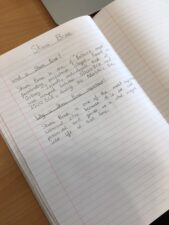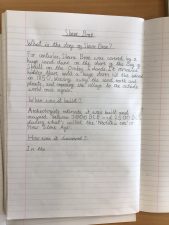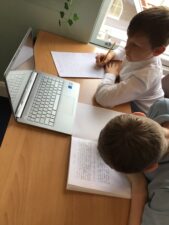The Teaching of Writing at Mersey Park Primary School
Writing Progression
Please click the link below to view our Writing Progression at Mersey Park.
Writing Progression at Mersey Park
Phonics
In Foundation Stage 2 and Year One, we follow the Little Wandle Letters and Sounds Revised Programme. Please see our Phonics page for more detail. Phonics will continue to be taught throughout the school for children who are not fully secure in their phonics knowledge.
Spelling
From Foundation Stage, the children are taught to read and spell age appropriate words from the National Curriculum. From Year Two the children have structured spelling sessions include handwriting, revision of previous spelling patterns and the spelling and understanding of new words. Throughout school we also have a set of Non-negotiable spellings which the children must spell correctly in all aspects of written work. Success and effort in weekly spelling tests is rewarded with spelling prizes. Please see Year group information pages for this week’s spellings.
Early Writing
Early writing begins in F1 where children are encouraged to make marks which they start to give meaning to. They are provided with a wide range of stimulating equipment to encourage make making such as large brushes with paint or water and dragging streamers through puddles. Once large muscles co-ordination is well developed children begin to develop small muscle co-ordination using chalk, pencils and felt pens. As children’s marks develop they are motivated to write in a wide range of ways through carefully planned opportunities for writing e.g. chalking on paving stones, boards and notepads in the home corner. They begin to use some of their letter knowledge in their writing. This usually begins with letters from their name and progresses on to children using known letters for the initial sound in words. As their phonic knowledge increases they begin to segment simple words (vc/cvc) to spell. When the children are able to spell simple words they are introduced to how sentences are structures. The idea of Talk for Writing is used to develop simple story structures, embedding key vocabulary and developing independent writing confidence.
Writing
At Mersey Park, all our writing stems from high quality starting texts. Foundation Stage follow the Early Years Statutory Framework and Years 1- 6 follow the National Curriculum for writing. We also teach the children a specific, progressive range of sentence types in each year group. Throughout school, ambitious vocabulary is taught, discussed and displayed across all areas of the curriculum. Children and consistently encouraged to use this new, challenging vocabulary both in spoken language and in all aspects of their their written work.
Talk for Writing
Talk for Writing forms a big part of our writing journey. This approach to writing gives children a framework and structure, allowing them to build confidence and become more independent writers. Drama and Role Play help to bring stories alive and make them memorable. Regular Big Write sessions help children to develop stamina for writing and see the progress they have made in their own writing.
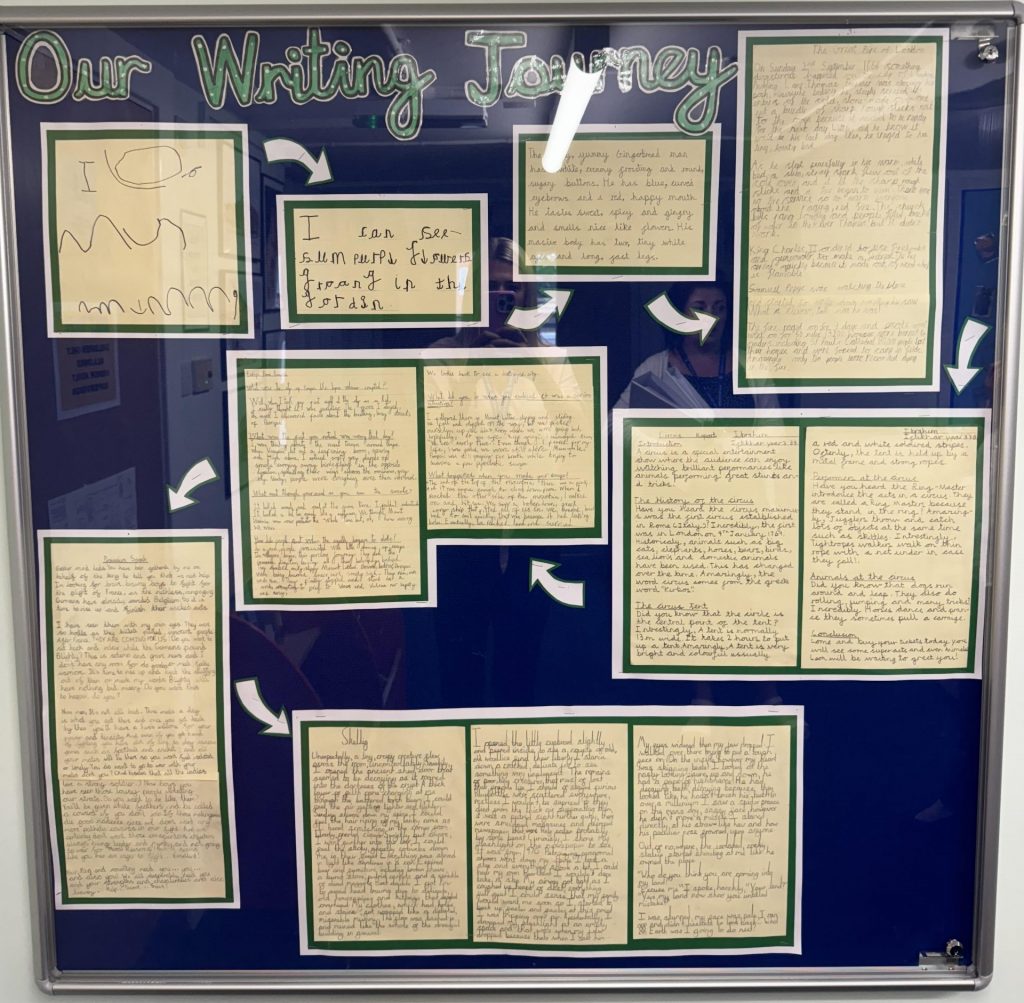
Autumn
Foundation 1
In Foundation 1 the children begin to listen to the sounds around them, identify initial sounds and mark make on a variety of materials. They learn to enjoy books and stories.
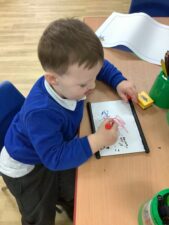
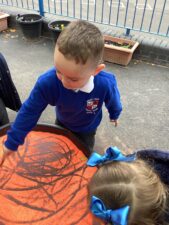
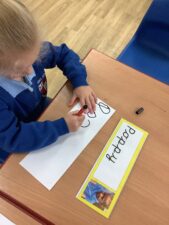
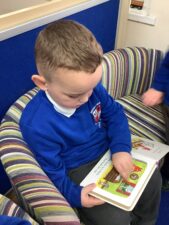
Foundation 2
In Foundation 2 the children continue to build on their love of books and stories. The children continue to develop their mark making skills by practising letter formation, using the letter sounds to write words and build these into sentences.
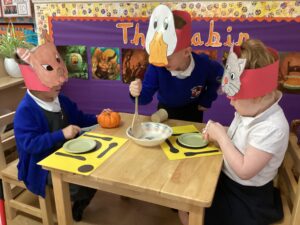
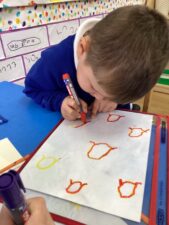
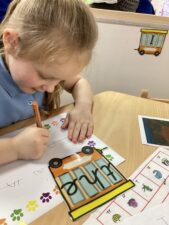
Year 1
In Year 1 the children continue to develop their knowledge of stories through reading and enjoy retelling them using Talk for Writing techniques such as food tasting, short burst writing and adding actions to the stories. This encourages the children to include plenty of story structure in their story maps and when they write their new stories. The children then use all this knowledge to create their own versions of the stories.
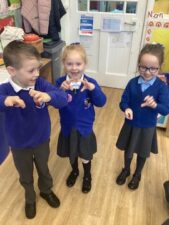
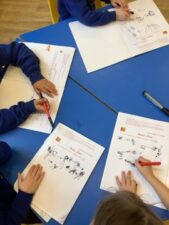
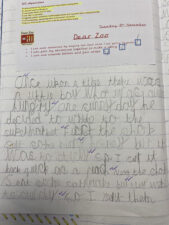
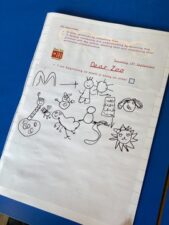
Year 2
In Year 2 the children continue to build on their Phonics knowledge and work on spelling patterns. They use this knowledge in their writing and develop new techniques to enhance their writing. They complete short burst writing tasks such as character descriptions, setting descriptions and recounting events. They continue to act out the stories they read in order to make it a memorable experience and use these actions to create their story maps before rewriting their versions of a story.
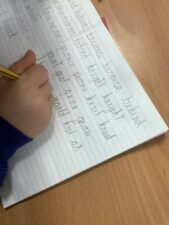
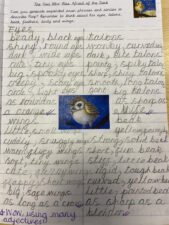
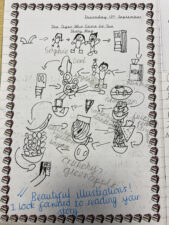
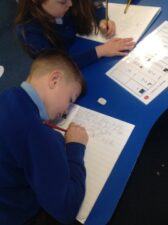
Year 3
In Year 3 the children learn the story of Rumpelstiltskin. They create their own story maps then orally retell the story. They then think about how they can use this story as inspiration for their own story and innovate the key elements of the story to create their own. They use a boxing up template to think about what key elements of the story they will innovate.
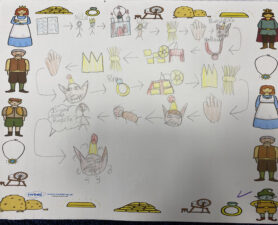
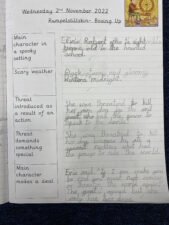
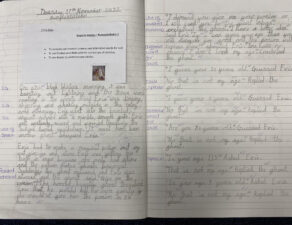
Year 4
In Year 4 the children take inspiration for their writing from their history topic and write about Gods and Goddesses. They also write poems about climate change and pollution. They enjoy bringing their Literacy to life in the Outdoor Classroom this term. They describe it as feeling like they were in Pompeii!
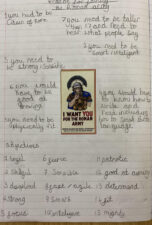
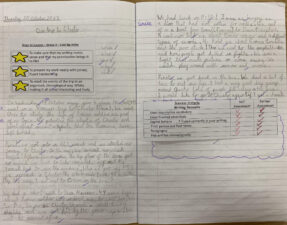
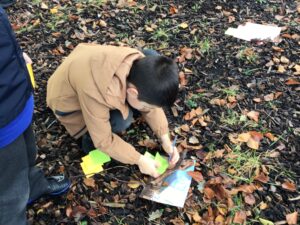
Year 5
In Year 5 the children read Ancient Greek myths from our History Topic. They act out Perseus and Medusa in small groups to help build their vocabulary and prepare them for writing. The children continue to develop their Talk for Writing skills by: discussing the themes and conventions of the myths they’ve read; short burst writing where they describe the main characters and then by creating a story map with actions. Once the children fully understand the myth, they then write their own version using the original myth as inspiration. Once this process is completed, the children use boxing up skills to change elements of the myth i.e. the main characters/settings in order to write their own innovated myth.
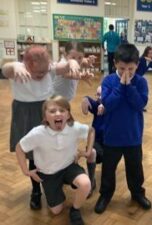
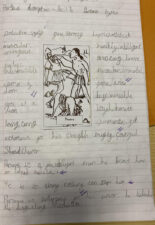
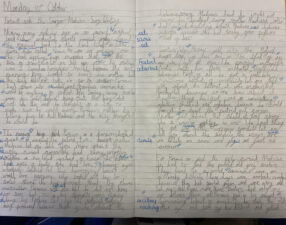
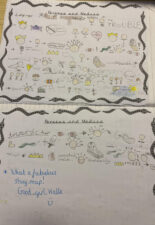
Year 6
In Year 6 the children study the book ‘Skellig’ by David Almond. They start the book and use ‘Talk for writing’ to re write an extract. They then innovate the extract and write their our own story as a narrative. They include direct speech and different sentence types to create atmosphere within their writing.
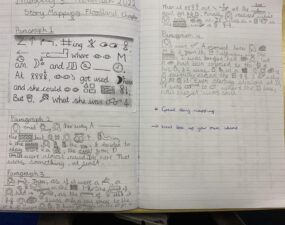
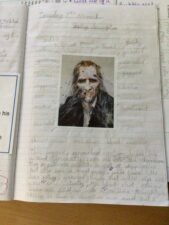
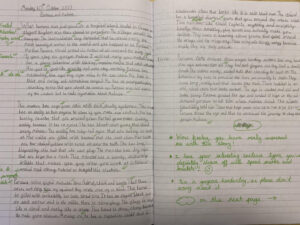
Spring Term
Foundation 1
In Foundation 1 the children continue to learn new nursery rhymes and they listen carefully for rhyming words.
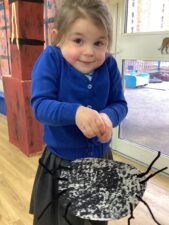
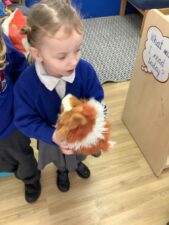
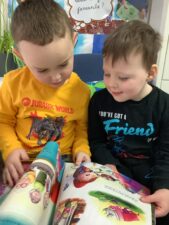
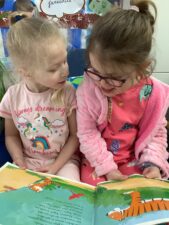
Foundation 2
In Foundation 2 the children love the enhancements that are added to their role play area when they find out about Chinese New year. Lots of new vocabulary is introduced and the children use it with their friends as they pretend to cook and enjoy Chinese food. They also create their own story maps to help them re-tell the story. A basket arrived in Foundation 2 with some clues inside and a story for the children to share.
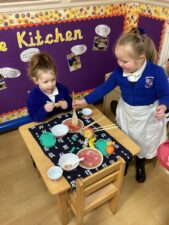
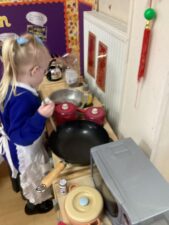
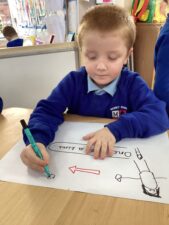
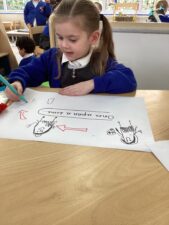
Year 1
In Year 1, the children learn the story The Gingerbread Man and The Three Little Pigs. They continue the Talk for Writing approach, learning the story through repetition and actions, short burst descriptions and drawing wonderful story maps. The children then apply these skills to help write the story, working hard to remember capital letters, finger spaces and punctuation at the end. They also become story inventors by changing characters and events to invent a brand new story, such as The Paper Doll!
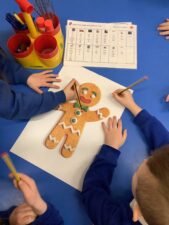
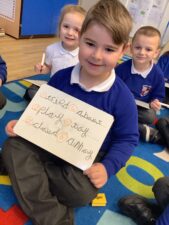
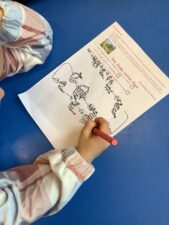
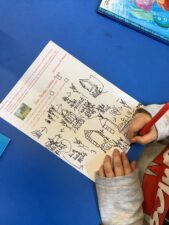
Year 2
In Year 2 the children read about the adventures of Katie Morag and all the activities that take place on the Isle of Struay. They compare Katie Morag’s two Grandmas and write descriptions of them. They write letters to Mairi Hedderwick, the author of the Katie Morag books asking her about where she gets her ideas from.
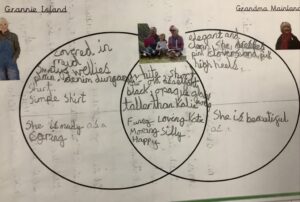
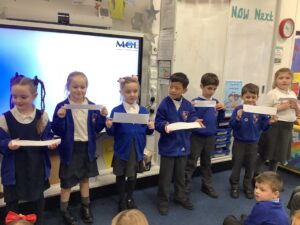
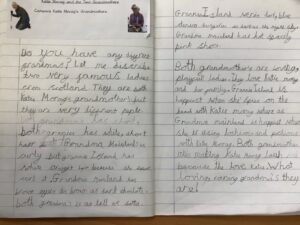
Year 3
In Year 3 the children read Leon and The Place Between and complete many activities based on the book. They talk about the circus, in the past and present day, and write a report on their findings. The children also imagine themselves at the circus and write a recount of their time there using fronted adverbials and expanded noun phrases.
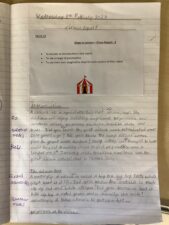
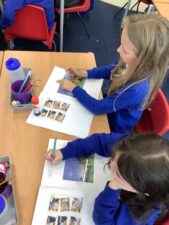
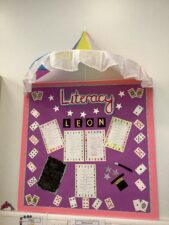
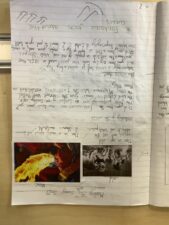
Year 4
In Year 4 the children read the book, ‘The Miraculous Journey of Edward Tulane’ and complete a range of creative writing activities based around this amazing book.
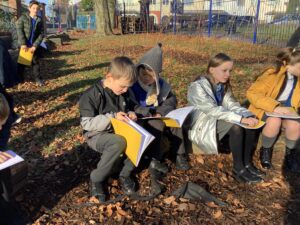
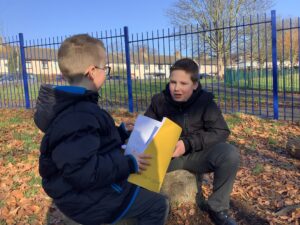
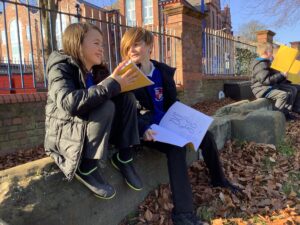
Year 5
In Year 5 the children take inspiration from their class novel ‘Private Peaceful’ to write letters home from the trenches – focusing on the emotions, relative clauses and a range of new sentence types. They spend time in the outside classroom imagining what it would be like on a cold, uncomfortable morning in the trenches.
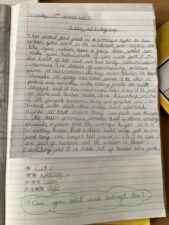
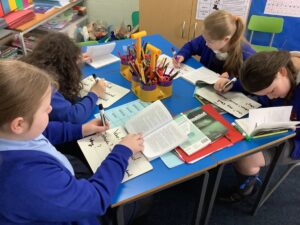
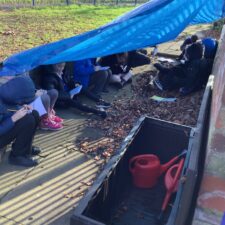
Year 6
In Year 6 the children study their literacy spine novel ‘Skellig’. The children look at mystery items in a box to look for clue about what the story is about. They then make further predictions about the story from a variety of different book covers. The children write a newspaper report about the finding of Skellig and a non- chronological report about owls.
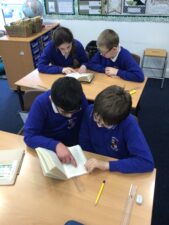
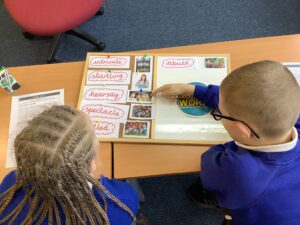
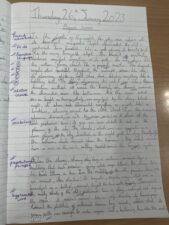
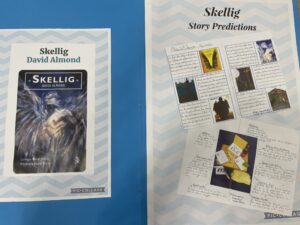
Summer Term
Foundation 1
In Foundation 1 the children wrote a letter to stick man to ask him for help.
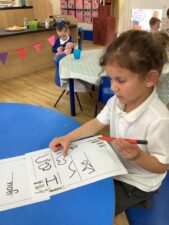
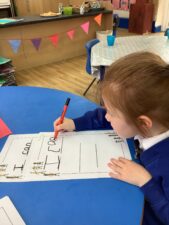
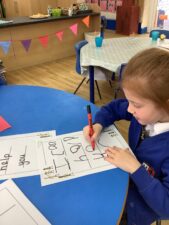
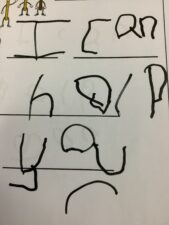
Foundation 2
In Foundation 2 the children learn the story of Jack and the Beanstalk. They have opportunities to retell the story in the small world, verbally talk through the story and begin to write sentences to tell the story.
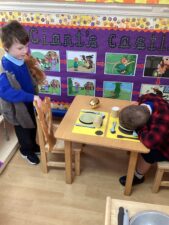
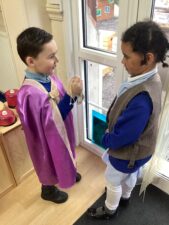
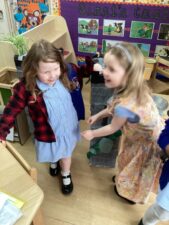
Year 1
In Year 1 the children learn and retell the story of Little Jack and become story inventors by changing the characters. They use power adjectives to up-level their descriptive writing to 2A sentences. They also learn a brand new story “We’re Going to Find a Monster”.
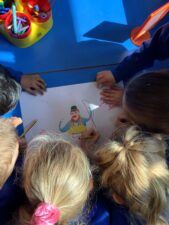
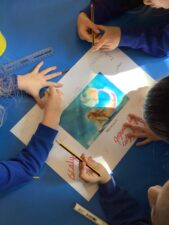
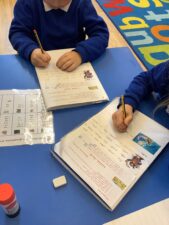
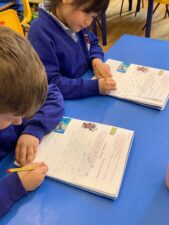
Year 2
In Year 2 the children explore the story of ‘Starbird’ through dictionary work and vocabulary activities and character and setting descriptions. They continue to use Talk for Writing to learn, retell and edit the story so they can write their own stories based on the text.
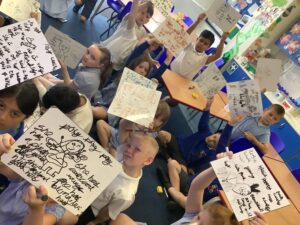
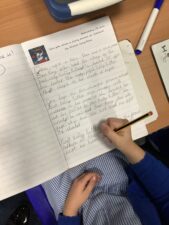
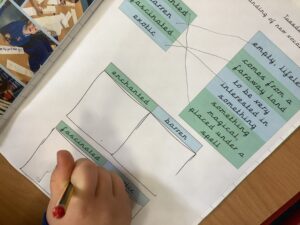
Year 3
In Year 3 the children read the story of ‘Ice Palace’. Some oft heir favourite activities include writing 2A noun descriptions to describe the settings in the book and create a Kenning poem based on Ice Palace.
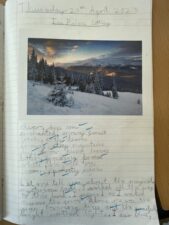
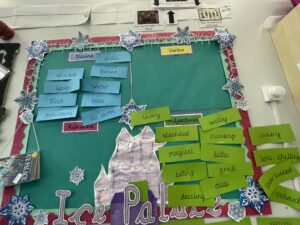
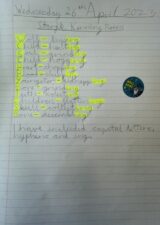
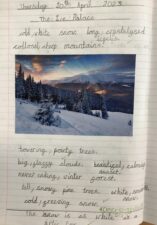
Year 4
In Year 4 the children continue to use Talk for Writing to memorise the ancient story of Beowulf. They practice it by saying it out loud, adding actions, drawing a story map of events and then creating their own versions of the story.
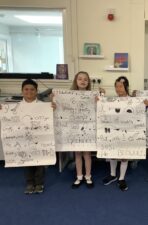
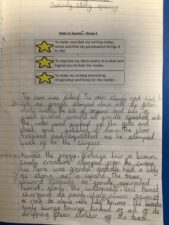
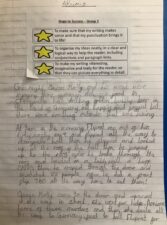
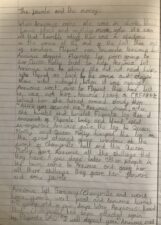
Year 5
In Year 5 the children read Wolf Brother as their class novel. They focus on setting descriptions and use of figurative language.
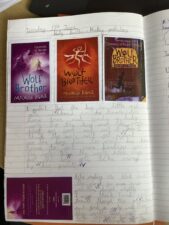
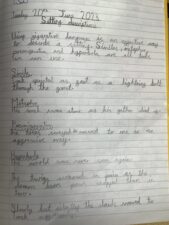
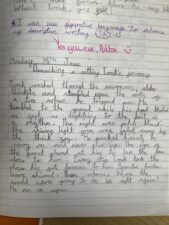
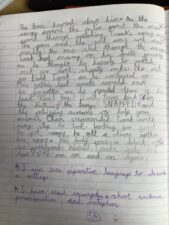
Year 6
In Year 6 the children study Stone Age to Iron Age and write a non-chronological report about Skara Brae, an island off the coast of Scotland which holds great historical importance for archaeologists looking for information about the past.
